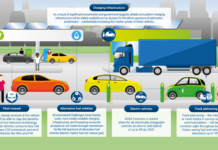The head of this working group is MSc Eleonora Blazevska
 Currently preparing PhD in Strategic Management at Massachusetts Institute of Technologies-Management Executive Education program for Innovation of Products and Services: MIT’s Approach to Design Thinking. Since 2011 and ongoing: Chief Business Development Officer at TELELINK MK., which is a Digitalization and ICT Business Services company with an estimated 43 employees and 27Mill revenue, founded in 2001. Eleonora is currently based in Skopje. Experience in C Level Management, Business Administration, Institutional and Enterprise level relations. Member of leading business organisations and founder member of non-profit business leader clubs (Rotary, Lazarus). Domain specialization in: Telecommunications services; Market entry and development; Business administration; Solution design; Market analysis. Professional and technical development knowledge and skills: Investment Planning; Strategic planning; Certified Project Manager; HR management. Strong extensive experience in delivering targeted results and achieving set goals and in designing & implementation of a functional organization, programs and processes.
Currently preparing PhD in Strategic Management at Massachusetts Institute of Technologies-Management Executive Education program for Innovation of Products and Services: MIT’s Approach to Design Thinking. Since 2011 and ongoing: Chief Business Development Officer at TELELINK MK., which is a Digitalization and ICT Business Services company with an estimated 43 employees and 27Mill revenue, founded in 2001. Eleonora is currently based in Skopje. Experience in C Level Management, Business Administration, Institutional and Enterprise level relations. Member of leading business organisations and founder member of non-profit business leader clubs (Rotary, Lazarus). Domain specialization in: Telecommunications services; Market entry and development; Business administration; Solution design; Market analysis. Professional and technical development knowledge and skills: Investment Planning; Strategic planning; Certified Project Manager; HR management. Strong extensive experience in delivering targeted results and achieving set goals and in designing & implementation of a functional organization, programs and processes.
The Digitalization, Business Development, and Industry working group, typically operates at the intersection of digital technology adoption, business growth, and industrial sectors. Its mission is to help industries leverage digitalization for enhanced competitiveness, innovation, and sustainable development. Here are the key tasks and responsibilities that such a working group might undertake:
-
Digitalization Strategy: Develop and promote strategies for integrating digital technologies into industrial processes, products, and services, with a specific focus on fostering business development and growth.
-
Technology Assessment: Stay updated on emerging digital technologies (e.g., IoT, AI, cloud computing) and assess their relevance and potential applications within various industrial sectors. Evaluate how these technologies can drive business innovation.
-
Business Model Innovation: Assist industries in reevaluating and evolving their business models to align with digitalization trends. Encourage new revenue streams, cost savings, and improved customer experiences through digital channels.
-
Education and Training: Offer training programs and workshops to educate industry professionals about digital technologies, their strategic implications, and business development opportunities. Focus on building digital literacy and leadership skills.
-
Market Research: Conduct market research and trend analysis to identify emerging opportunities and customer demands that can inform digitalization strategies and new business development initiatives.
-
Funding and Investment: Provide guidance on accessing funding sources, including venture capital, grants, and public-private partnerships, to support digitalization efforts and business growth.
-
Startup Collaboration: Facilitate collaborations between traditional industries and startups that offer innovative digital solutions. Promote open innovation and co-development partnerships.
-
Research and Development: Support research and development initiatives that aim to create and enhance digital solutions relevant to specific industry needs and market demands.
-
Digital Transformation Roadmaps: Assist industries in developing digitalization roadmaps that outline a clear path for adopting digital technologies and realizing business development goals.
-
Data-Driven Decision-Making: Promote data-driven decision-making and analytics to identify growth opportunities, optimize operations, and enhance customer insights.
-
Ecosystem Building: Foster the development of innovation ecosystems that bring together industry players, startups, academic institutions, and technology providers to drive digitalization and business development.
-
Policy Advocacy: Advocate for policies and regulations that support digitalization and business development, including regulatory frameworks that encourage innovation, data sharing, and technology adoption.
-
SME Support: Develop programs and resources tailored to helping small and medium-sized enterprises (SMEs) navigate digitalization challenges and seize growth opportunities.
-
Strategic Partnerships: Establish strategic partnerships with industry associations, chambers of commerce, and other relevant organizations to expand outreach and support.
-
International Collaboration: Collaborate with international organizations and initiatives focused on industrial digitalization and business development to share best practices and promote cross-border partnerships.
-
Performance Metrics: Develop and disseminate key performance indicators (KPIs) and metrics to measure the impact of digitalization efforts on business development and growth.
-
Sustainability Integration: Ensure that digitalization strategies align with sustainability goals, including resource efficiency, reduced environmental impact, and responsible supply chain practices.
-
Digital Marketing and Sales: Assist industries in leveraging digital channels for marketing, sales, and customer engagement, optimizing online presence and reach.
-
Digital Talent Development: Promote workforce development initiatives to nurture digital talent and leadership within industries, addressing the digital skills gap.























